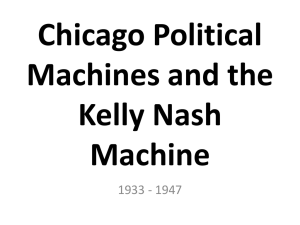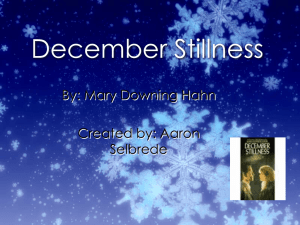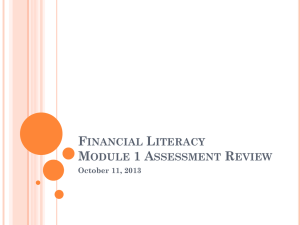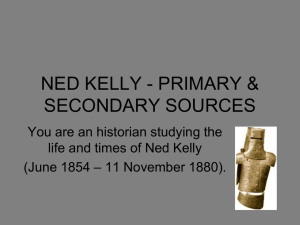Ned Kelly: Fearless, Free, and Bold
advertisement
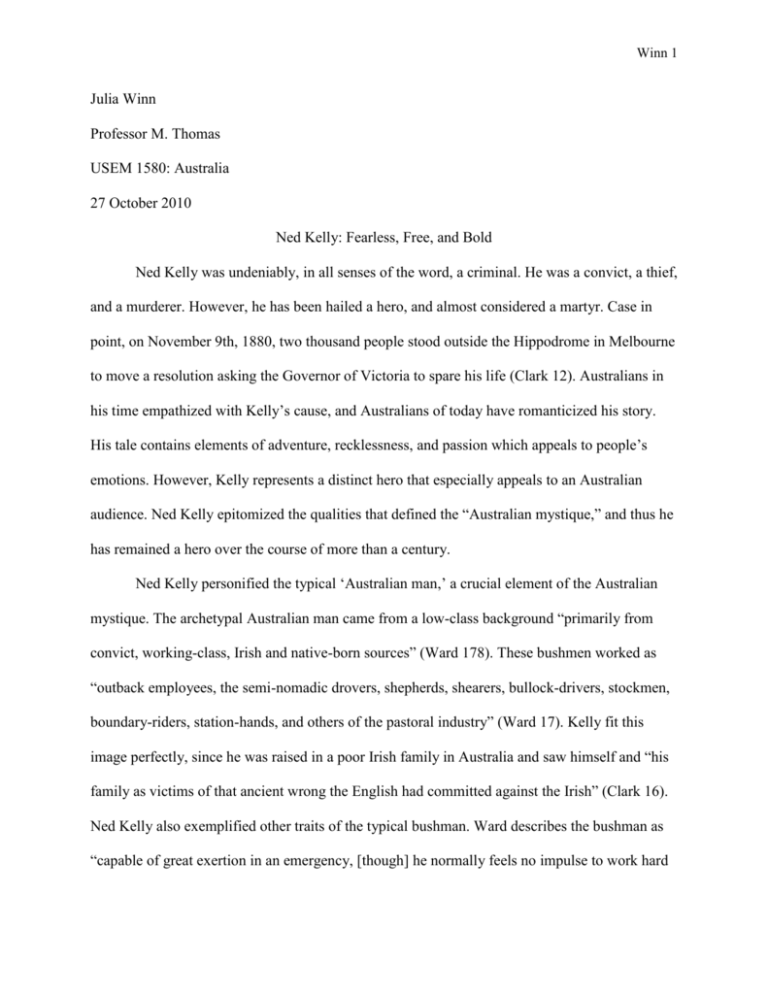
Winn 1 Julia Winn Professor M. Thomas USEM 1580: Australia 27 October 2010 Ned Kelly: Fearless, Free, and Bold Ned Kelly was undeniably, in all senses of the word, a criminal. He was a convict, a thief, and a murderer. However, he has been hailed a hero, and almost considered a martyr. Case in point, on November 9th, 1880, two thousand people stood outside the Hippodrome in Melbourne to move a resolution asking the Governor of Victoria to spare his life (Clark 12). Australians in his time empathized with Kelly’s cause, and Australians of today have romanticized his story. His tale contains elements of adventure, recklessness, and passion which appeals to people’s emotions. However, Kelly represents a distinct hero that especially appeals to an Australian audience. Ned Kelly epitomized the qualities that defined the “Australian mystique,” and thus he has remained a hero over the course of more than a century. Ned Kelly personified the typical ‘Australian man,’ a crucial element of the Australian mystique. The archetypal Australian man came from a low-class background “primarily from convict, working-class, Irish and native-born sources” (Ward 178). These bushmen worked as “outback employees, the semi-nomadic drovers, shepherds, shearers, bullock-drivers, stockmen, boundary-riders, station-hands, and others of the pastoral industry” (Ward 17). Kelly fit this image perfectly, since he was raised in a poor Irish family in Australia and saw himself and “his family as victims of that ancient wrong the English had committed against the Irish” (Clark 16). Ned Kelly also exemplified other traits of the typical bushman. Ward describes the bushman as “capable of great exertion in an emergency, [though] he normally feels no impulse to work hard Winn 2 without a good cause” (16). Kelly believed the police were threatening his family, and that immediate action needed to be taken. He stated that: “I am not a murderer, but if there is innocent life at stake, then I say I must take some action” (“The Trial of Ned Kelly” 110). Kelly considered his reckless criminal action as action in an emergency to protect his family. Ward also describes the classic Australian as a “fiercely independent person who hates officiousness and authority” (17). Kelly certainly displayed unbounded independence and dislike of authority. Kelly demonstrates self-reliance and a lack of faith in others by saying: “No one knows anything about my case but myself” (“The Trial of Ned Kelly” 108). In his Cameron letter, he displays his independence and defiance by addressing the police fearlessly thus: “And if words be louder, I will oppose your laws with no offence”(Brown 243). Ned Kelly’s background, action, and independence may have represented the traditional Australian bushman, but it was his hatred of authority that made him a legendary symbol of Australian nationalism. The most significant defining quality of the Australian bushman that Kelly possessed was a hatred of authority, namely the police. A hatred for the police defined the mindset of early Australian settlers, and still permeates Australian culture. Ward states that “it may be doubted whether the police force of any English-speaking country, except Ireland, has ever been more thoroughly unpopular than were those of most Australian colonies in the last century” (189). Bushmen thought the police “corrupt, besotted, cowardly, brutal and inefficient” (Ward 190). The ‘Australian man’ hated authority, “especially when these qualities are embodied in military officers and policemen” (Ward 17). Kelly despised the police with a passion, leading him to commit violent crimes. Kelly viewed the police as hypocritical and disrespectful. In his Cameron letter, he says he saw the police steal a horse from George King (Brown 237). Thus, to Kelly, the police were no better than common criminals, and this hypocrisy helped him justify his actions. Winn 3 Kelly also believed the police to be corrupt. He writes: “I am really astonished to see Members of the Legislative Assembly led astray by such articles as the Police, for while an outlaw reigns their pockets swells, tis double pay and country girls – by concluding…if I get justice I will cry for a go” (Brown 242-43). Though slightly humorous, this statement really displays Kelly’s distrust toward police motivations. His statement reveals that he thought the police greedy and driven by money not justice. Hatred of the police drove Kelly to murder. He saw his actions not as cold-blooded, but as acts of self-defense (“The Trial of Ned Kelly 107). As Professor Clark states, Kelly’s “daemonic hatred of the police took over so that he behaved as one possessed with an evil spirit” (19). Intense hatred worked Kelly into a frenzy. When asked if he would do it again, Kelly replied that he “would go to the barracks, and shoot every one of the – traps, and not give one a chance” (Melvin 104). Kelly’s defiance against the police proved unrelenting. He showed no remorse and stood firmly by his actions against authority. The ‘Australian man’ defined the national mystique, and thus Australians still regard Ned Kelly as a hero. Bushrangers, or men fleeing the law, “were only men who did openly, professionally, and on a grand scale, what every bushman did furtively and sporadically, or only dreamed of doing” (Ward 200). Therefore, the common man glorified the bushranger image. Over time, they began to symbolize romanticized freedom. Bushmen and bushrangers became “folk-heroes because they were symbols of the emergent Australian national feeling” (Ward 200). Kelly, then, was the perfect hero. He embodied the traits of many common workers, but he committed deeds that they imagined yet refrained from. People could rally around him because they, to a certain degree, sympathized with his cause. Professor Clark even believes that “there is something of Australia in his story – something of that nostalgia for the life of the free, the fearless, and the bold, uncorrupted by industrial civilization, with all its conformism” (22). The Winn 4 unique ‘Australian’ quality of his tale created a lasting impact. Ward writes that a “dislike and distrust of the policemen, at least partly merited, has sunk deeply into the national consciousness” (195). For example, a letter published in 1953 in the Sydney Morning Herald from a man, simply ranting about his hatred of the Sydney police portrays this hatred in a more modern time (Ward 195). So, even now, people respect Kelly’s staunch defiance to authority. Ned Kelly has also been romanticized over time. Beginning “in 1879 ballads in defence of Ned Kelly began to be sung in the pot-houses and tap-houses of north-eastern Victoria” (Clark 14). This media portrayal widened his fame and cast him as a hero for the common man. Kelly represented the “bush ethos”: the classic characteristics of the independent, working class, man on the land. The “distinctive ‘bush’ ethos [had] value as an expression and symbol of nationalism”(Ward 360). Australians trace the bush ethos back to the roots of their country, and thus it serves as a pertinent symbol of nationalism. Since Kelly embodied this bush ethos perfectly, he too symbolizes Australian nationalism. Kelly’s presence today can be attributed to his ties to Australian nationalism and the Australian mystique. Ned Kelly was a common criminal who became a legend and arguably a hero for Australians. He perfectly portrayed all the aspects of the common working Australia man, except he was more reckless and rash in his actions. What might have been seen as cold-blooded killing is regarded by many an act of bravery against the repression of authority. His daring acts, antiauthoritarian spirit, and embodiment of bush ethos rocketed him into the spheres of heroism. Over time, his image has been highly romanticized through songs and the media. However, the distinct Australian values held by the founding bushmen still exist today, perpetuating his fame. Kelly “wanted to live his life, as he put it ‘fearless, free and bold’” (Clark 17). People can still relate to these feelings today. As Professor Clark states, “Perhaps we can recognize that the spirit Winn 5 of Dionysus, the frenzy that swept through Ned Kelly, lives in all of us” (22). Ned Kelly’s glory and fame will continue to live on as long as man resents the injustice ofg authority.


